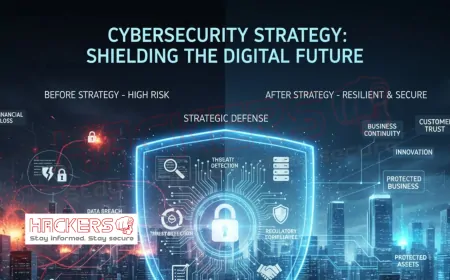What Future Trends Should Entrepreneurs Watch in the Cybersecurity Industry?
The cybersecurity industry is evolving at a breakneck pace, driven by the relentless rise of cyber threats and the rapid adoption of new technologies. For entrepreneurs, this dynamic landscape offers a wealth of opportunities to innovate and build profitable businesses. From artificial intelligence to quantum computing, emerging trends are reshaping how businesses protect their digital assets. Staying ahead of these trends is crucial for entrepreneurs looking to carve out a niche in this high-demand field. In this blog post, we’ll explore the key future trends in cybersecurity that entrepreneurs should watch, offering practical insights in a beginner-friendly way to help you seize these opportunities.

Table of Contents
- AI and Machine Learning in Cybersecurity
- Zero Trust Architecture
- Cloud Security Solutions
- IoT and Edge Device Security
- Quantum Computing and Cryptography
- Automation and Orchestration
- Regulatory Compliance and Privacy
- Cybersecurity Training and Awareness
- Blockchain for Security
- Cyber Insurance and Risk Management
- Conclusion
- Frequently Asked Questions
AI and Machine Learning in Cybersecurity
Artificial intelligence (AI) and machine learning (ML) are transforming cybersecurity by enabling faster and smarter threat detection. These technologies analyze vast amounts of data to identify patterns and predict attacks before they happen, making them a goldmine for entrepreneurs.
- Develop AI-powered tools for real-time threat detection, like spotting malware in network traffic.
- Offer managed AI services for small businesses lacking in-house expertise.
- Create AI-driven platforms to automate security audits and reduce human error.
The demand for AI-based cybersecurity solutions is skyrocketing, offering opportunities for startups and consulting firms.
Zero Trust Architecture
Zero Trust is a security model that assumes no one—inside or outside an organization—is automatically trusted. It requires continuous verification of users and devices, making it a growing trend as remote work and cloud adoption rise.
- Offer consulting services to help businesses implement Zero Trust frameworks.
- Develop tools that integrate Zero Trust principles, like multi-factor authentication.
- Provide training on Zero Trust for IT teams to ensure proper adoption.
Cloud Security Solutions
As businesses move to cloud platforms like AWS, Azure, and Google Cloud, securing these environments is a top priority. Cloud security is a massive opportunity for entrepreneurs to offer specialized services.
- Create cloud-native security tools to monitor and protect cloud infrastructure.
- Offer managed cloud security services for small and medium-sized businesses.
- Develop solutions for securing hybrid cloud environments, blending on-premises and cloud systems.
IoT and Edge Device Security
The Internet of Things (IoT) is exploding, with billions of connected devices like smart cameras and sensors. These devices are often vulnerable, creating a need for robust security solutions.
- Build AI-driven tools to monitor and secure IoT networks in real-time.
- Offer consulting for industries like manufacturing or healthcare that rely on IoT.
- Develop affordable security solutions for consumer IoT devices, like smart home systems.
Quantum Computing and Cryptography
Quantum computing, though still emerging, poses a future threat to traditional encryption methods. Entrepreneurs can get ahead by developing quantum-resistant cryptography solutions.
- Research and develop post-quantum encryption algorithms for businesses.
- Offer consulting to help organizations prepare for quantum-related risks.
- Partner with tech firms to integrate quantum-safe solutions into existing systems.
Automation and Orchestration
Automation streamlines repetitive cybersecurity tasks, like patching vulnerabilities or responding to alerts, while orchestration integrates multiple security tools for seamless operation. This trend is ideal for entrepreneurs offering efficient solutions.
- Develop automation tools for incident response, like blocking malicious IPs.
- Create platforms that orchestrate security tools for unified threat management.
- Offer managed services to automate cybersecurity for resource-strapped businesses.
Regulatory Compliance and Privacy
Stricter regulations like GDPR, CCPA, and upcoming data privacy laws are pushing businesses to prioritize compliance. Entrepreneurs can capitalize by offering compliance-focused solutions.
- Build AI tools to automate compliance audits and data protection processes.
- Offer consulting to help businesses navigate complex regulations.
- Create affordable compliance solutions for small businesses in regulated industries.
Cybersecurity Training and Awareness
Human error remains a leading cause of breaches, making employee training a critical need. Entrepreneurs can create engaging, tech-driven training programs to address this gap.
- Develop AI-powered training platforms that simulate phishing or social engineering attacks.
- Offer workshops to educate employees on cybersecurity best practices.
- Create gamified apps to make cybersecurity training engaging and effective.
Blockchain for Security
Blockchain’s decentralized and tamper-proof nature makes it a promising tool for cybersecurity, from secure data storage to identity verification.
- Develop blockchain-based solutions for secure data sharing in industries like healthcare.
- Create identity management systems using blockchain to prevent fraud.
- Offer consulting to help businesses integrate blockchain into their security strategy.
Cyber Insurance and Risk Management
As cyberattacks rise, so does the demand for cyber insurance. Entrepreneurs can offer services to help businesses assess risks and secure insurance, or partner with insurers.
- Develop tools to assess cyber risks for insurance underwriting.
- Offer consulting to help businesses reduce risks and qualify for lower premiums.
- Partner with insurance providers to offer bundled security and insurance packages.
| Trend | Business Opportunity | Target Market |
|---|---|---|
| AI and Machine Learning | Threat detection tools, managed services | SMBs, enterprises |
| Zero Trust | Consulting, authentication tools | Corporations, remote workforces |
| IoT Security | Monitoring tools, consulting | Manufacturing, smart homes |
| Cyber Insurance | Risk assessment tools, partnerships | Insurers, businesses |
Conclusion
The cybersecurity industry is brimming with opportunities for entrepreneurs who stay ahead of emerging trends. From AI and Zero Trust to IoT security and cyber insurance, these trends address the evolving needs of businesses in a digital-first world. By developing innovative tools, offering consulting services, or creating training programs, entrepreneurs can tap into high-demand markets. While challenges like skill gaps and high development costs exist, they can be overcome through partnerships and leveraging open-source technologies. The future of cybersecurity is bright, and entrepreneurs who act now can build profitable, impactful businesses in this critical field.
Frequently Asked Questions
What is AI’s role in cybersecurity?
AI analyzes data to detect and predict threats, automating tasks like malware detection and incident response.
Why is Zero Trust important?
Zero Trust ensures continuous verification of users and devices, reducing risks in remote and cloud environments.
How does cloud security create opportunities?
The rise of cloud platforms like AWS drives demand for tools and services to secure cloud infrastructure.
What are IoT security challenges?
IoT devices are often vulnerable due to weak encryption, creating a need for specialized security solutions.
Is quantum computing a threat to cybersecurity?
Yes, it could break traditional encryption, but it also creates opportunities for quantum-resistant solutions.
How can automation help cybersecurity businesses?
Automation streamlines tasks like patching or alerts, allowing entrepreneurs to offer efficient services.
What regulations drive cybersecurity demand?
Laws like GDPR and CCPA require businesses to protect data, creating opportunities for compliance tools.
Why is cybersecurity training important?
Human error causes many breaches, so training programs help employees avoid mistakes like phishing.
How can blockchain improve cybersecurity?
Blockchain’s decentralized nature ensures secure data storage and identity verification.
What is cyber insurance?
Cyber insurance covers financial losses from cyberattacks, creating demand for risk assessment services.
Can small businesses benefit from these trends?
Yes, affordable AI and cloud security solutions are increasingly tailored for small businesses.
Do I need technical skills to start a cybersecurity business?
Not always—partner with experts or focus on non-technical areas like consulting or training.
How do I market cybersecurity solutions?
Create content, network at industry events, and use social media to showcase your expertise.
What are the costs of starting a cybersecurity business?
Costs vary, but open-source tools and cloud platforms can keep startup expenses low.
Is IoT security a growing market?
Yes, with billions of connected devices, IoT security is a rapidly expanding field.
How do I stay updated on cybersecurity trends?
Follow blogs like Krebs on Security, attend webinars, and join professional groups.
Can I focus on one cybersecurity trend?
Yes, specializing in a niche like AI or IoT security can help you stand out.
What is post-quantum cryptography?
It’s encryption designed to resist quantum computing attacks, a growing area of opportunity.
Are there opportunities in cybersecurity consulting?
Yes, businesses need guidance to implement trends like Zero Trust or compliance solutions.
How fast is the cybersecurity industry growing?
The industry is growing rapidly due to increasing cyber threats and technology adoption.
What's Your Reaction?










































































